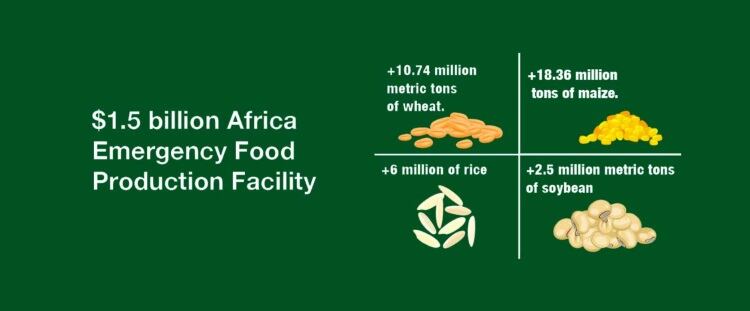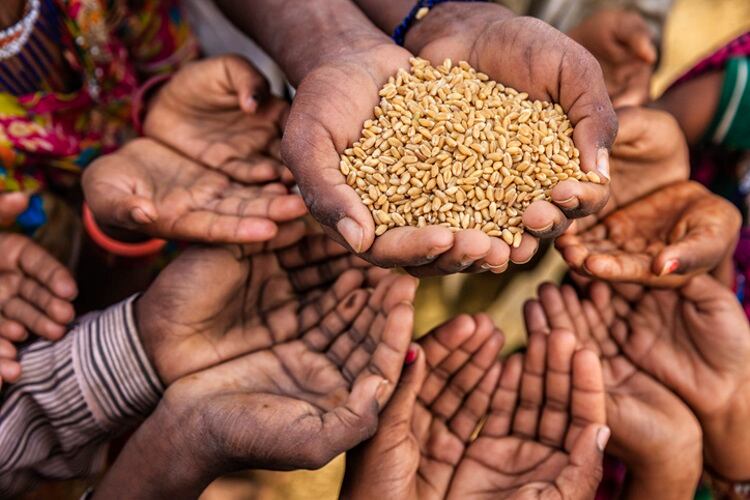Putin’s war is resulting in dire forecasts of increased hunger and spiking food prices around the world. In poorer countries like Africa, the cost of basic staples like wheat has shot up, exacerbating an already dismal situation caused by an extended drought. The Russia-Ukraine conflict means Africa is now facing a shortage of at least 30 million metric tons of wheat and maize. Between 2018 and 2020, Africa imported almost 44% of its wheat from Russia and Ukraine.
The AfDB’s African Emergency Food Production Facility is an unprecedented comprehensive initiative to fill the food shortfall and provides 20 million African smallholder farmers with the certified seeds and technology to fast-track the production of 38 million tons of food.
It will also support market growth and post-harvest management.
This is a $12bn increase in food production in just two years.
“Food aid cannot feed Africa. Africa does not need bowls in hand. Africa needs seeds in the ground, and mechanical harvesters to harvest bountiful food produced locally. Africa will feed itself with pride for there is no dignity in begging for food,” said African Development Bank Group president Dr Akinwumi Adesina.
Crippling price hikes
The price of wheat has soared in Africa by over 45% since the war in Ukraine began. Fertilizer prices have also soared by 300%, and the continent faces a fertilizer shortage of 2 million metric tons. Many African countries have already seen price hikes in bread.
If this deficit is not made up, food production in Africa will decline by at least 20% and the continent could lose over $11bn in food production value.
The African Development Bank’s $1.5bn strategy will lead to the production of 11 million tons of wheat; 18 million tons of maize; 6 million tons of rice; and 2.5 million tons of soybeans.

The Facility has a structure to work with multilateral development partners to ensure rapid alignment and implementation, enhanced reach and effective impact.
This will increase technical preparedness and responsiveness, while also including short-term measures to address the urgent food crisis and the long-term sustainability and resilience of Africa’s food systems.
For example, the Facility will use its convening influence with major fertilizer manufacturers, loan guarantees and other financial instruments to provide fertilizer to smallholder farmers across Africa over the next four farming seasons. After consultations, African Union agriculture and finance ministers have also agreed to implement critical policy reforms to address the systemic hurdles that impede farmers from receiving modern inputs. This includes strengthening national institutions overseeing input markets.
Weaning Africa off wheat imports
A five-year ramp-up phase will follow the two-year African Emergency Food Production Facility. This will build on previous gains and strengthen self-sufficiency in wheat, maize and other staple crops, as well as expand access to agricultural fertilizers.
The five-year phase will deliver seeds and inputs to 40 million farmers under the AfDB’s Technologies for African Agricultural Transformation programme.
For the past three years, this initiative has delivered heat-tolerant wheat varieties to 1.8 million farmers in seven countries, increasing wheat production by 2.7 million metric tons, worth $840 million.
“The Africa Emergency Food Production Facility builds on lessons learned from the African Development Bank's Feed Africa Response to Covid-19 programme,” said Dr Beth Dunford, AfDB’s VP for Agriculture, Human and Social Development.
“That programme has provided a strategic roadmap to support Africa’s agriculture sector and safeguard food security against the pandemic’s impact.”
A global cause
The African Development Bank’s African Emergency Food Production Facility is designed to support African countries through the food crisis.
In April, UN Secretary-General António Guterres appointed Dr Akinwumi Adesina onto a select Steering Committee of the Global Crisis Response Group.
The Global Alliance for Food Security – spearheaded by the Government of Germany – provides a forum for the African Emergency Food Program Facility, which is part of a coordinated and collective effort by development partners and countries to accelerate food production in the short term while remaining focused on medium- and longer-term actions to build resilience.
The AfDB has also partnered with the International Fund for Agricultural Development (IFAD) and has agreed to be part of the coordination team and steering committee of the Food and Agriculture Resilience Mission (FARM), supported by the Government of France.
The Facility lays out the foundation and complements FARM activities, which aims to strengthen local production systems in Africa and reduce food loss to support development of sustainable and resilient food systems.
The Ivory Coast-headquartered African Development Bank Group comprises three entities: the African Development Bank (AfDB), the African Development Fund (ADF) and the Nigeria Trust Fund (NTF). On the ground in 41 African countries with an external office in Japan, the Bank contributes to the economic development and the social progress of its 54 regional member states.




